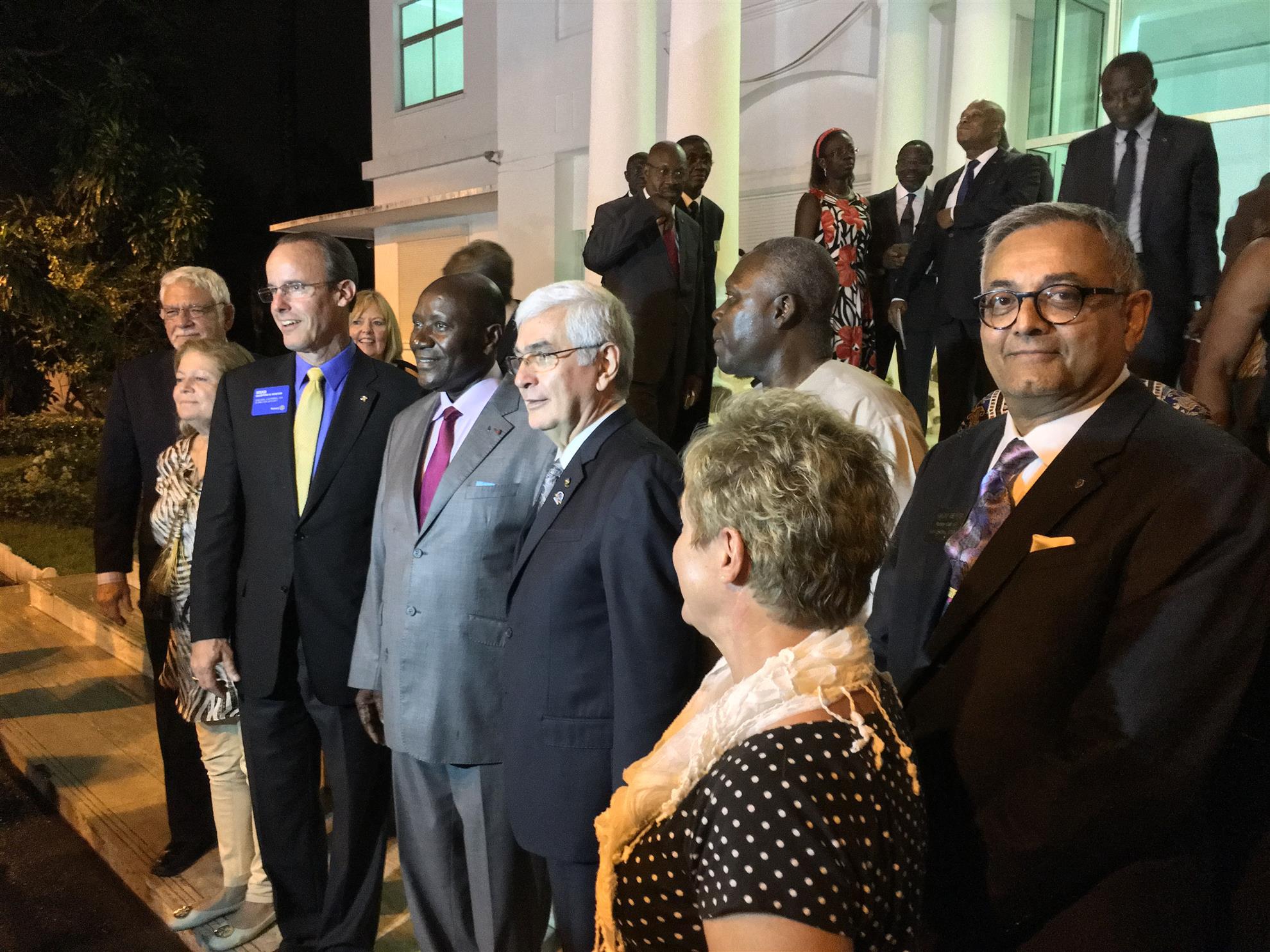 "Rotary is a Membership Organization that does Service." With those words, our June 23 speaker, Brad Howard (aide to RI President-Elect Jennifer E. Jones), turned our traditional model on its head, asking us to consider whether we are just another service organization among all the many service organization, or to consider whether we are an organization that enables members to grow and become the leaders our world needs. "Rotary is the gateway to live better lives for better businesses, family and community", said Howard in his inspirational address. To view Brad Howard's full presentation CLICK HERE. Photo: Brad Howard and RCFC Member Rajiv Mehta on a polio vaccination trip to Africa.
"Rotary is a Membership Organization that does Service." With those words, our June 23 speaker, Brad Howard (aide to RI President-Elect Jennifer E. Jones), turned our traditional model on its head, asking us to consider whether we are just another service organization among all the many service organization, or to consider whether we are an organization that enables members to grow and become the leaders our world needs. "Rotary is the gateway to live better lives for better businesses, family and community", said Howard in his inspirational address. To view Brad Howard's full presentation CLICK HERE. Photo: Brad Howard and RCFC Member Rajiv Mehta on a polio vaccination trip to Africa.Howard started with a brief acknowledgement of his long-time connection with RCFC member Betty Brown, thanked Bob Meroney for his summary of the many-faceted relationship between Rotary and the United Nations, and congratulated our club on our up-coming in-person meetings where we will be able to reconnect and re-establish friendships within the club.
Brad looks forward, across the Rotary community, to anticipating what comes next on scales ranging from the local to the global. He expects that we will be able to capture the best parts of the difficult last year.
While challenging us to think beyond our traditional service model, much of his discussion centered around the many-faceted aspects of Rotary as a service organization. As an example of the external benefits of that service focus, he pointed out that, based mostly on our spare time, Rotary has been instrumental in reducing polio to the point that there were only two cases of wild polio in the world over the last year. And that was only one aspect of Rotary’s impact on disease/health, literacy, and the many other areas of Rotary focus. He was extremely positive about the results from bringing the full resources of the organization to bear on problems that cross borders, all contributing to making the planet a more peaceful place.
Most people, he suggested, don’t really appreciate the full power of Rotary, even beyond the UN. Most people view Rotary locally. However, the Rotary brand is much more than just a service organization. He suggests that the Rotary brand is what we stand for and how other people see us. He presented several examples from his own experiences: kids in Ghana identifying the Rotary symbol with eradication of polio; another organization distributing mosquito bed nets based on the Rotary model; Bill Gates joining Rotary in the fight against polio because of the effectiveness of the Rotary model; various national leaders talking about the effectiveness of Rotary in accomplishing results that no one else can. Rotary connects leaders in a community to enable accomplishment of things that individuals can’t do on their own. The organization allows us to expand our goals so that there need not be a lack of essential supplies or a lack of sanitation in a community.
However, for members, the internal benefits are as important as those external benefits. The organization empowers us to believe that we can make a difference. The Rotary Foundation might be thought of as a Bank of Dreams. Within the organization, we have the power to “do”. When communities are challenged, we have the connections to do more. This provides the framework for creating lasting changes, not only globally or in our local communities, but also in ourselves.
In response to questions:
One of the big organizational issues for Rotary International for 2022 – 2023 is to make hybrid plans for district governors training. How can we train and connect in the post-Covid world? He is looking forward to increased DEI (diversity, equity, inclusion) emphasis, across areas of thought, gender, age, and global representation.
Rotary is growing in some parts of the world, not in others. Where and why? It is not growing in the US, the UK, Australia and parts of Europe. It is growing in Taiwan, Korea, Africa, and India – with a special case in Germany. In India, there is rapid growth, but retention is a problem. In Korea and Taiwan, there is emphasis on bringing in women and younger members. In Germany, Rotary is a very difficult organization to join, but has extremely high retention – it has a high reputation or prestige factor.
Brad suggested that we need to be purposeful in our membership, embracing leaders and influencers. Our brand must include both a message and a media presence: what are you saying and what do you stand for? Part of the message is service, but part is what you do for your members. How do we make a difference? Part of the message is that we are “People of Acton”!